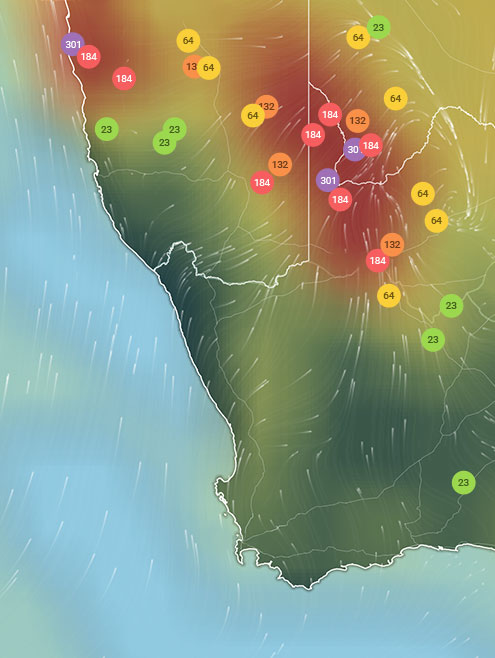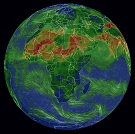Be the first to measure and contribute air quality data to your community
172.4K people follow this city






AIR QUALITY DATA SOURCE
Find out more about contributors and data sources| Weather | Clear sky |
| Temperature | 66.2°F |
| Humidity | 36% |
| Wind | 1.7 mp/h |
| Pressure | 30 Hg |

US AQI
69*
live AQI index
Moderate
| Air pollution level | Air quality index | Main pollutant |
|---|---|---|
| Moderate | 69* US AQI | PM2.5 |
| Pollutants | Concentration | |
|---|---|---|
| PM2.5 | 20.9*µg/m³ | |
PM2.5
x4.2
PM2.5 concentration in Karaj is currently 4.2 times the WHO annual air quality guideline value
| Sensitive groups should reduce outdoor exercise | |
| Close your windows to avoid dirty outdoor air GET A MONITOR | |
| Sensitive groups should wear a mask outdoors GET A MASK | |
| Sensitive groups should run an air purifier GET AN AIR PURIFIER |
| Day | Pollution level | Weather | Temperature | Wind |
|---|---|---|---|---|
| Today | Moderate 69 AQI US | 68° 55.4° | ||
| Friday, Apr 19 | Moderate 67 AQI US | 69.8° 57.2° | ||
| Saturday, Apr 20 | Moderate 64 AQI US | 75.2° 60.8° | ||
| Sunday, Apr 21 | Moderate 54 AQI US | 75.2° 60.8° | ||
| Monday, Apr 22 | Moderate 58 AQI US | 77° 64.4° | ||
| Tuesday, Apr 23 | Moderate 81 AQI US | 73.4° 55.4° | ||
| Wednesday, Apr 24 | Moderate 63 AQI US | 66.2° 55.4° |
Interested in hourly forecast? Get the app
Karaj is the capital city of the Alborz Province in Iran. It is almost looked upon as a suburb of Tehran. A 2016 census estimated the population was almost 2 million people. It is thought of as a major industrial city which produces amongst other products, sugar, wire and textiles.
At the beginning of 2021, Karaj was experiencing some very poor quality air. A US AQI figure of 148 was recorded which classifies it as “Unhealthy for sensitive groups”. This is based on recommendations from the World Health Organisation (WHO). The recorded concentration figures were as follows: PM2.5 - 54.7 µg/m³, sulphur dioxide (SO2) - 33 µg/m³ and carbon monoxide (CO) - 3091.5 µg/m³.
Under these conditions, it is advisable to wear a good quality face-mask when going outside or shopping. Doors and windows should be kept closed to avoid the ingress of dirty air into the rooms. The use of an air purifier would be advantageous if one is available. All forms of outdoor exercise should be postponed until such time that the air quality improves.
The main source of air pollution in Karaj is debatable. Some say it comes from vehicle emissions whilst others insist it comes from industry. But whatever the source, there can be no dispute as to the poor quality of air in and around the city.
The interesting thing is that the officials disagree on finding the main cause of air pollution and, consequently, the responsibility for dealing with the problem. However, in recent weeks it seems that most of them have come to the conclusion that mobile sources have the largest share in the emission of pollutants in Tehran province; Sources where, of course, there is still controversy over whether passenger cars, diesel cars or even motorcycles have a larger share.
Other sources of information have a more precise answer as to where the main source lays. They state that 60.8 per cent of sources Tehran's air pollution comes from mobile sources, including cars and motorcycles, of which 33 per cent are diesel-powered (including trucks, buses, cars and minibuses), about 18 per cent are gasoline passenger cars and 10 per cent are motorcycles.
In the colder winter months, Karaj is very susceptible to air inversions. Scientifically, air inversion in autumn and winter occurs when a layer of warm air is formed above the cold air near the Earth. In such conditions, air stability is created and instead of decreasing the temperature with increasing altitude, there will be an increase in temperature to a few hundred meters above the ground with increasing altitude.
With the prevalence of air inversion on the ground, especially in large and industrial urban areas, pollutants produced by cars, factories and home heating appliances, due to the heavy cold air and the unwillingness of this air to climb and expand and combine it with the upper air, condenses on the surface of the earth and increases the concentration of pollutants in the lower-level air which is breathed in by people, resulting in respiratory problems for its residents.
Throughout 2019, Karaj recorded “Moderate” figures between 12.1 and 35.4 µg/m³ for 11 months of the year. Only in December did the figures go higher with levels of 36.7 µg/m³. The average figure for 2018 was 22.2 µg/m³ so the 2019 figure of 23 µg/m³ was certainly showing signs of improvement. There was no data collected for earlier years.
A spokesman for the Air Pollution Research Centre, noting that Tehran has a population of 13 million, stated: Pollution control and monitoring stations in the city of Tehran show the concentration of particulate matter less than 2.5 microns in the southwest and the centre of Tehran has the highest concentration and this concentration is about twice as high as regions one and two.
There is also controversy as to the quality of gasoline available to motorists. Some say it is inferior quality and therefore highly likely to cause pollution when burnt. Conversely, others argue that because of the age of the cars and the poor filtration systems, they would produce just as much pollution even with high-quality gasoline.
81 per cent of motorcycles, 73 per cent of buses and 60 per cent of trucks in this province are worn out and need to be rebuilt or scrapped altogether and replaced with newer models with advanced technology. Newer models have emission controls and filters fitted as standard. New motorbikes have an automatic cut-out on the engine which operates as soon as forward motion stops. This is extremely beneficial as the engines cut out whilst the bike is queuing at traffic signals where levels of air pollution are known to be higher because of that very reason.
A significant part of air pollution is related to the heating systems of buildings, and in this regard, the city council should have a significant impact on reducing pollution caused by these facilities by instigating criteria for buildings under construction and environmental classification of buildings.
Municipalities should take measures such as expanding green spaces, developing public transportation, supporting the production and development of electric vehicles by applying exemptions and special incentives for car owners, strengthening vehicle technical inspections, and changing urban planning criteria. As well as the formulation of policies that lead to changes in the heating systems of buildings and, by applying the necessary incentives or penalties, lead consumers to the correct model based on maintaining environmental standards.
What can happen in the ear, throat and nose of a person who is exposed to air full of suspended particles and dust is that an increase in sensitivity possibly leads to sinusitis. When air enters the throat through the nose, allergies in the upper airways may occur and may even cause asthma in the advanced stages. It is therefore recommended to avoid unnecessary exposure when there is dust in the air, and it should be borne in mind that the use of ordinary masks has little effect on filtering suspended particles.
Regular nasal rinsing when there is this contamination with the help of saline and rinsing serums can improve the efficiency of the mucous membranes, in which case harmful substances are removed and breathing becomes better.
No locations are available.